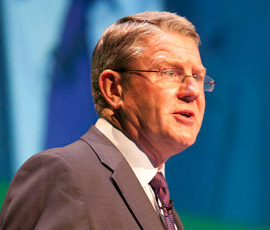Kendall hits back at Lord Krebs’ cull claims

Farm leader Peter Kendall has slammed a speech by Lord Krebs in which the peer accused the NFU of “dishonestly filleting” data to show badger culling has a bigger effect on curtailing bovine tuberculosis.
Lord Krebs, who led the 10-year Randomised Badger Culling Trials (RBCT) and has acted as a government scientific adviser, had previously spoken out against plans for pilot culls in Gloucestershire and Somerset labelling them a “crazy scheme”
Speaking in the House of Lords on 23 October, Lord Krebs said the decline in the incidence of the disease following a badger cull was “not 30% that the NFU [is saying]; that is misleading – a dishonest filleting of the data.”
Mr Kendall took issue with the remark in a letter sent to Lord Krebs. Mr Kendall wrote: “Follow-up data from the RBCT showed a beneficial effect of 28.3%. I do not think that the NFU’s statements of an effect of ‘up to 30%’ can be said to be a wild exaggeration.”
Mr Kendall acknowledged that the effect of perturbation – disease spread by badgers fleeing the cull zone – reduced the net figure in the RBCT to 16%. But the longer term data showed that perturbation had disappeared after five years.
NFU president Mr Kendall wrote: “Moreover, the RBCT had been conducted on a smaller scale and without hard boundaries, whereas the projected trial areas are over a bigger area and without porous boundaries – factors which I do not believe you have acknowledged.”
He added: “I do not, therefore, accept your contention that this amounts to a dishonest filleting of the data.”
“We recognise that this disease and the modes of transmission are complex. That is why we support a full range of measures, including cattle controls, biosecurity, slaughter of infected animals and, in time, vaccination.”
Peter Kendall
The NFU had never presented culling badgers as a panacea to dealing with TB in badgers and cattle, said Mr Kendall.
“We recognise that this disease and the modes of transmission are complex. That is why we support a full range of measures, including cattle controls, biosecurity, slaughter of infected animals and, in time, vaccination.”
Mr Kendall said he was also “extremely surprised” that Lord Krebs had suggested that trial culls due to take place this autumn in Somerset and Gloucestershire had been delayed at the NFU’s request following a crude cost-benefit analysis.
“It was, in fact, a responsible decision based on the practicalities of conducting a cull of a number of badgers that was much greater than we expected, so late in the year ahead of the closed-period for cage-trapping in December.”
Farmers remained committed to carrying out the cull effectively and meeting the full costs, said Mr Kendall. The delay was a decision taken in the light of evidence. A badger cull is now expected to take place next summer.
Keep up with the latest news on the badger cull
